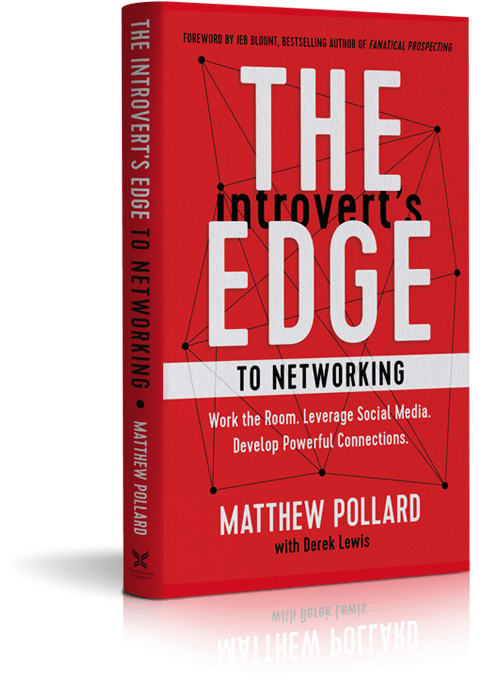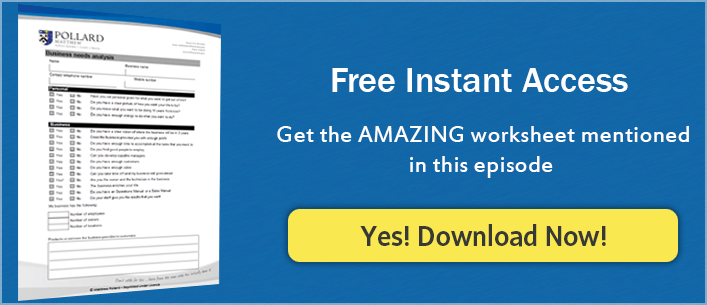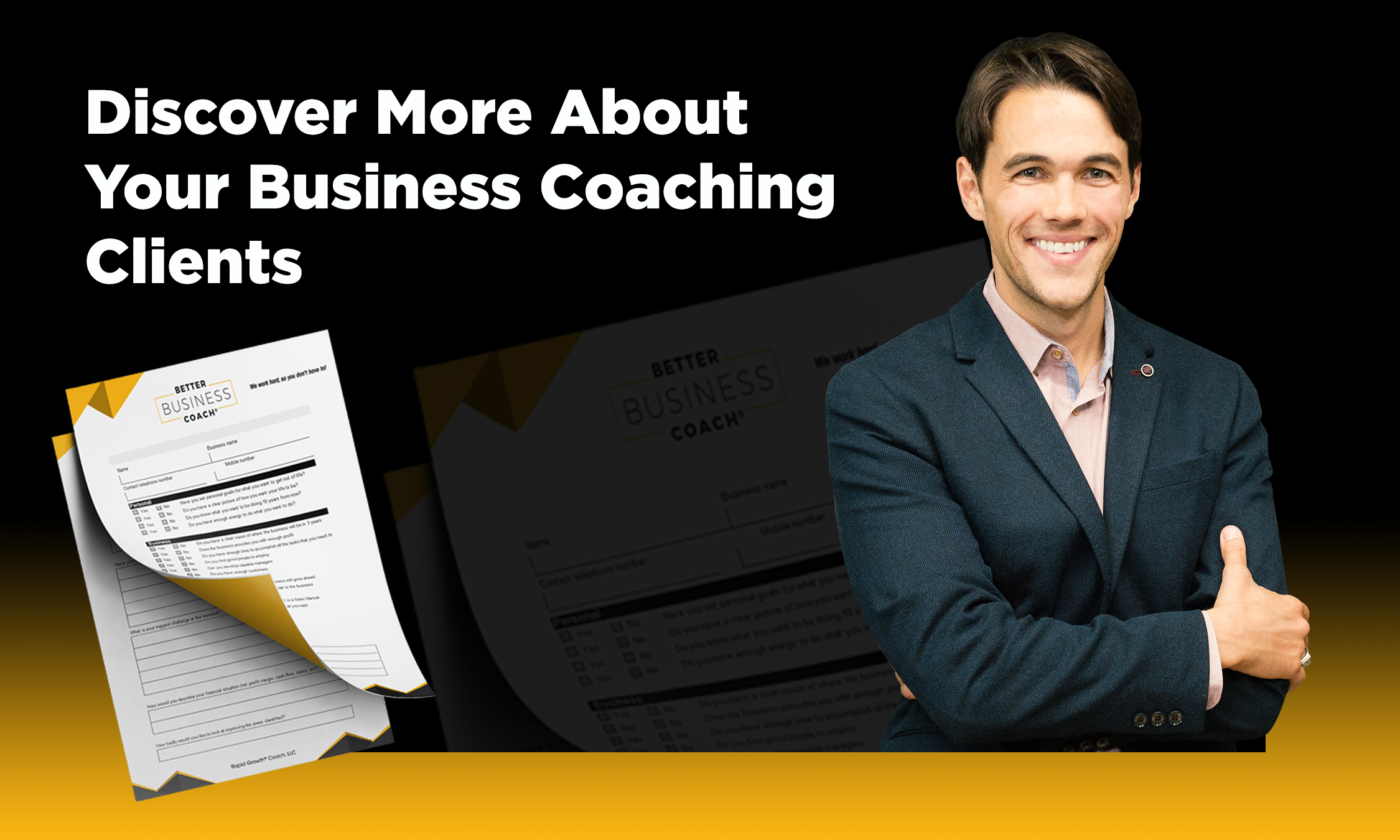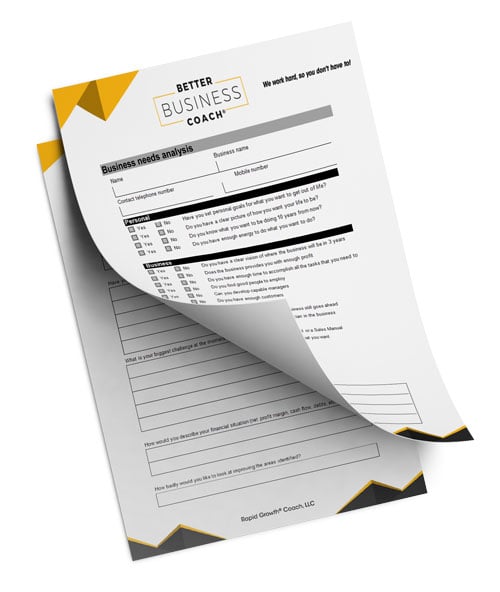Better Business Coach Transcript
This is Better Business Coach, session number 23.
This is The Better Business Coach Podcast, your source for critical sales training, proven education and actionable worksheets – all downloadable for immediate use. We work hard so you don’t have to. Now your host, the rapid growth guy himself, Matthew Pollard.
Hello everyone and welcome back to Better Business Coach. My name’s Matthew Pollard, and as always I am your rapid growth guy. Today I’m going to be giving away yet another worksheet. And this the worksheet you do about fourth with a client. And it’s called, “Get to know yourself.” Now this specific document is actually so you can get to understand your client on a deeper level. And so the client can understand themselves on a deeper level.
So before I get started, I just want to ask again – if you haven’t already, please hop on to betterbusinesscoachpodcast.com. Click on the iTunes link, and make sure you post a review on iTunes. And I also want to make sure that you guys are getting the full value out of this podcast. If you don’t know, you can access much more notes on each one of the segments that I’m talking about – by going to betterbusinesscoachpodcast.com and clicking on any of the sessions in the jukebox that you’ll see there. You can click on “read more,” and it will take you to a much bigger series of session notes. And some of it is actually things that I don’t cover in the time I have on the podcast. So look, I don’t want to waste any more of your time, let’s get straight into this worksheet.
Okay everyone, so this is the Get to know yourself worksheet. And it’s important to make clear again, this is a video podcast. So if you’re listening to this in audio, you may want to track back to it later. At betterbusinesscoachpodcast.com, you’ll see a jukebox. Just click on episode 23, and you’ll be able to click on read more. And that’ll allow you to access the video. You’ll also be able to find it on YouTube, or by going back to iTunes and typing in “Better Business Coach Podcast,” and clicking on the video version. You’ll also be able to download this worksheet so you can use it straightaway with your clients at matthewpollard.com/bbc023.
Life Coaching
Okay, so the first thing I want to make clear about this worksheet is you may choose not to use it. It can be conceived as life coaching. So as a result, use your own discretion. I tend to find that small businesses absolutely love it. However, some corporates really think it’s life coaching and it doesn’t apply to them – and therefore, you lose a bit of rapport by doing it. Again, I’ve had a lot of corporate clients that have relished it, and as a result I am telling you not to disregard it with corporate, but use your discretion to decide which times to use it, and which times not to.
And the reason why this form is so great, is it gets people to think about things that they potentially have never thought about before. And it can take up to an hour to do, because people really love talking about themselves. And this form gets them to answer questions about themselves that they perhaps have never vocalized before. And that’s why it works so well.
Questions A Business Coach Should Ask to Get to Know His Client
So let’s look at the first question. “What do you enjoy doing?” They may need time to think about this. Because it may not be something that they’ve thought about before. So embrace the skill set that we discussed in BBC 009, or episode 9. Where we talked about active listening. Give them the time they truly need to answer that question. Again, it may be something they’ll be able to answer, they just need some time to think about what the answer would be. Again, this question, and this is why I’m talking about corporate could be perceived as life coaching. And that’s why you want to use your discretion as to whether or not you use this form or not.
The next question is, “What makes you happy?” And what you’re really trying to understand here is whether they like external rewards or they like to be intrinsically motivated. What I mean by that is – do they like to make money? And if they like to make money, obviously increasing their business is going to be a great thing. If they’re intrinsically motivated, they may get really excited by just having a successful business. And that’s great, and we can definitely work for that. One of the things we’re really looking for though is – do they enjoy being told they’re doing a good job?
Because for a business owner especially, this is very, very difficult. This is one of the things that I learned, and I talked about in BBC 004, episode 4. Where I talked about 7 of the most surprising things I found when I first started business coaching. And one of them was how lonely it was at the top. Now this is a very hard thing if they enjoy being told they’re doing a good job. As a business owner, it just doesn’t happen very often. So you need to build that into your strategy. And you might have to tell them continuously that they’re doing well and be their mascot. And for you to do that, might allow you to keep them as a client, and continually build rapport with them. Because they’ll appreciate you doing that for them.
Some clients you’ll also find say that they enjoy being left alone to write procedures. Now this is not ideal. And the reason why it’s not ideal is that you’re going to have to work on them marketing their business and getting out there and working with staff and growing their business. And if they don’t enjoy doing any of that and they want to be internal all the time, you might need to do some life coaching to make sure that they decide that they want to go out and they want to start talking to clients.
So let’s scroll down to the next questions. The next question is, “Is there anything that they want to do that they haven’t accomplished yet?” Now this is a very important question, to make sure that you don’t get kicked in the bum later because you didn’t ask it. For instance, what happens if they want to relocate to a different state or a different country perhaps – and you help them create a business that isn’t movable?
Now you’re going to be the guy or the girl that stops them from doing what they want to do. What if they want to start a new type of business and you’re talking about building this business over the next 5 years? In the back of their head, they’re going to know that this isn’t what they truly want. And you’re going to get yourself into trouble. So knowing what they want to accomplish that they haven’t accomplished yet gives you a real strength for coaching long term.
Another thing that could happen as a result of asking this question, is they can say they haven’t sold a business yet or listed the business on the stock exchange. And that’s one of the things that they’d really love to do in their lifetime. So you know that systematization, process design, creating the right skills for the staff, and creating strong and motivated staff are really, really important. So this is going to open up a full swagger of different coaching opportunities that you wouldn’t have perhaps known before.
The next question is, “Where would you like to spend more of your time, and doing what?” Now this is another way of asking the question that we asked above. Because sometimes when you ask a question in a different way, you get a different response. Or you allow somebody to rethink the same response, and you get different answers as a result. So here perhaps they say that they’d like to spend their time on holidays more, or out with their family more. So again, if you’re going to coach them and you’re going to be coaching them to grow their business – you need to know that there’s a conflict there, and you need to make sure that you manage that. Because the last thing you want to do is help them grow a business that’s obligating them to stay in the business 50 hours a week – when they want to be home and watching their kids dance recitals. That’s the last thing that you want to do. So you need to be aware of these things as soon as possible.
The next question is, “What would you do if you could do anything you wanted without limits?” And you’d be surprised. So many of these business owners love what they do, and they’ll respond, “I would do what I’m doing now, I just wouldn’t be so stressed about money, perhaps?” Others will say, “I’d get the hell away from here.” And you know that what that means is they’re not intrinsically motivated by their business. They’re just doing it for intrinsic reward. And you need to make sure that you focus on the dollars and cents. Or create a succession plan that gets them out of the business or out of a job that they may feel like they’re stuck in – and into business ownership, where they don’t have to be as highly involved. Some other people say, “I’d be involved in another business if I could afford it.” And this is vital information, because what that means is that this is a means to an end – it’s not what they want to be doing the rest of their life. And again, you can be setting this business up for sale, or you can be setting it up to be a business asset – not for somebody to be in the business, or the business owner to be in the business on a practitioner level.
Now the next question is, “How do you want to spend your time on a daily basis?” And here you’ll get great information about where their motivators are. For instance, they might say that they want to do the gym and then go for a walk in the morning. They may say that they want to do writing all the time. They may say they really want to get into the media, and they really love talking to people. So they’d love to do that more often on a daily basis. And other people say that they really want to get home by 3 o’clock every day – again, so that they perhaps can go and see their kids grow up a little bit more.
Now if you haven’t listened to BBC 004, I talk about the shocks that I had when I first learned to be a business coach. And one of the major shocks for me was the fact that people didn’t have the same views about business that I did. For instance, I wanted to create rapidly growing businesses and dedicate all of my time – especially when I was younger, to doing that. And what shocked me, when I started business coaching – was that other people didn’t have that motivator. They wanted to earn enough money by 3 o’clock, and then go home. And even if it was the best opportunity in the world, they didn’t care. They wanted to go home to their family as soon as 3 o’clock hit – no matter what was going on.
So now, let’s move down to the next question. Here what we’re trying to do is we’re just trying to get the priorities of the person straight. So we understand them in a lot fuller way. So the question is, “What is most important to you at this time of your life?” Because the reason why we ask it this time of your life is for instance – for me, I used to be a single guy and used to have lots of time and would allocate 80 hours a week to running a business. Now I have a girlfriend, I don’t want to be working 80 hours a week. I want to be working 40 at a maximum, because I want to spend as much time with her as possible. Now obviously getting this podcast into “New and Noteworthy,” I’ve had the opportunity cost of spending time with her, to make sure I can provide you guys enough content – so that you provide me those fantastic reviews that you’ve been sending through. However, as a whole, I like to be able to provide about 40 hours’ worth of work. I like that to earn my income, and then I like to spend the rest of the time with my friends and family.
So that’s me. And again, it’s important not to project what your values are onto them. So what I do is, I just simply say, “Out of family, a new career, your business, better health, physical fitness, more money, more time for yourself – which one of those do you value the highest?” And then I get them to tell me, and then we go through the list. Or I can hand them the sheet and tell them to number them based on whichever is their highest priority. And start with number 1 and work their way down to number 7. And by the time that they’ve done that, I’ve got a good indication that perhaps they want more money, and they’re willing to work as hard as possible to achieve that. For instance, I had a client just recently that had a wonderful technology – and they didn’t care how many hours they worked, they needed to make money. Other people will tell me, with no hesitation – they’re happy to work, however their primary focus is making sure they get home to the kids at 3, 4, 5 o’clock. Or seeing their kids grow up.
Now I should make clear that there’s quite a few of these questions where a client can tangent and talk for half an hour. Now remember what you’re charging. It’s important that you ask the questions, but if they tangent too far, you get them back on topic. Because again, if they spend 2 hours talking about this, and you’re charging x number of dollars per hour – they’re going to think, “Well what did I really get out of this session? I enjoyed talking about myself, but I got no real outcome. And that’s why this is still part of the initial sessions. But we need to get through it so that we can start to offer value.
Now they’re going to appreciate the fact that they’re going to be finding themselves in a lot of ways during this worksheet. But again, we need to move on if they tangent – because we don’t want to waste their time. The last question is, “What would I like to be doing 10, 20, or 30 years from now?” You may find that they say they want a new career. You may find that they’ve sold this business – in their head, in 2 years’ time. You may find that they want to be living in a different country. And this gives you a great understanding of what they want.
The other thing that can be instrumental for you as a business coach is if they say they want to sell the business, then you’re talking succession planning. Again, we’re talking procedures, we’re talking about systems. We’re talking about the right staff to prepare the business for sale. Succession planning is one of the most highest price tag things you can do as a coach to ensure that you get the client where they need to be to get the outcome that they so desire. You’re not doing them any disservice by doing all of that work for them, if it’s what they truly want.
Okay everyone, that was the, “Get to know yourself” worksheet. Now I hope you can see how vital this is at building rapport with your clients. They will see you as being able to fully understand them. And now, they’ll be so happy – because they’ll fully understand what they want as well. And you’ll be able to work together so much more congruently as a result. This specific worksheet, you’ll still be doing within the initial sessions. So it’ll allow you to create such a bond that all future sessions will be so much more powerful.
Now again, if you haven’t already, please take a second to post your review on iTunes, to allow us to get higher in new and noteworthy. It really does only take a second, and your support would be greatly appreciated. However, until next time, thank you very much and I’ll see you very soon. Cheers.
Thanks for listening to The Better Business Coach Podcast. Head over to matthewpollard.com for links, recaps and any downloadable templates mentioned in this and every show. Also, if you’ve not already rated our new podcast in iTunes, we’d love your support. Simply leave a review and the star rating you think worthy. Hey, and don’t forget to subscribe so you don’t miss a thing. Thank you in advance, and see you next time.



























